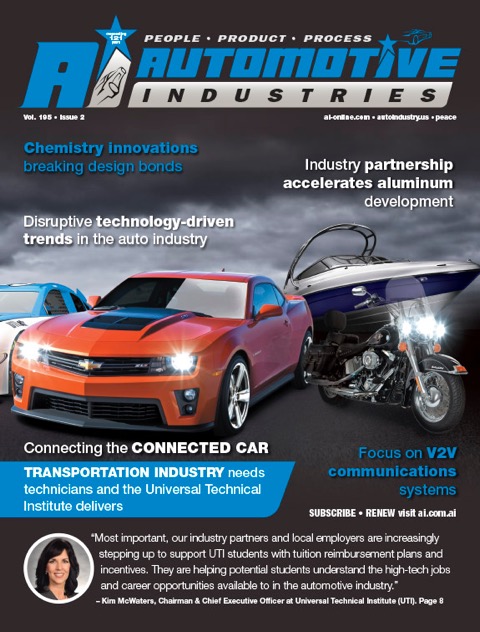An ageing workforce and growing number of vehicles, are contributing to a growing demand for skilled auto technicians.
So much so that the U.S. Department of Labor projects there will be more than 1.2 million jobs (1,279,100 to be exact) in the automotive, diesel, collision repair, motorcycle and marine industries by 2024.
Helping to meet the demand is the Scottsdale, Arizona headquartered Universal Technical Institute (UTI). It is a leading educator of future automotive, diesel, collision repair, motorcycle and marine technicians. With more than 200,000 graduates in its 51-year history, UTI offers undergraduate degree and diploma programs at 12 campuses across the United States, as well as manufacturer-specific training programs at dedicated training centers.
Averaging between 7 and 18 months in duration the courses are available through UTI’s four brands – UTI, Motorcycle Mechanics Institute (MMI), Marine Mechanics Institute (MMI) and NASCAR Technical Institute (NASCAR Tech). They teach students to diagnose, service and repair domestic and foreign automobiles, build high performance engines and troubleshoot problems using computerized diagnostic equipment. Students can also chose elective programs such as the BMW Service Technician Education Program (STEP), the Ford Accelerated Credential Training (FACT), Nissan Advanced Technician Training (NATT) and the Toyota Professional Automotive Training (TPAT). NASCAR Technical Institute is the only school of its kind to combine UTI’s core automotive training and National Association for Stock Car Auto Racing (NASCAR) approved technologies curriculum into one program.
UTI also offers a Diesel Technology program, which is designed to teach students how to diagnose, service and repair diesel systems and industrial equipment.
Automotive Industries (AI) asked Kim McWaters, UTI Chairman and CEO, whether it is difficult to attract students.
McWaters: UTI, along with the rest of the for-profit education industry, is facing a number of external challenges that hurt our ability to recruit new students. This is a counter-cyclical business. When unemployment is low or falling – a cycle we have been in for some time – people can get a job without going to school. In the wake of the 2008 recession, and with the perceived high costs of college, potential students are much more hesitant to invest in education. At the same time the actions of a few players have cast the entire for-profit sector in a bad light. This makes it more difficult to communicate the value of our education, and has led to some high schools and military bases shutting their doors to all for-profit schools, regardless of the outcomes they produce for students.
AI: How are you addressing the challenges?
McWaters: In Dallas and Long Beach we opened the first of several smaller, locally focused campuses that let students easily commute to campus and work while they go to school.
We are working to shift perceptions in all markets and build advocacy among leaders who make or influence educational policies and access, and with the parents, teachers, and counselors who influence students’ decisions. Our goal is to help people understand the opportunities available in the transportation industry and that, often, a quality technical education can be a better bet than going to college.
Our industry partners and local employers are increasingly stepping up to support UTI students with tuition reimbursement plans and incentives. They are helping students to identify the high-tech jobs and career opportunities available to in the automotive industry.
AI: What do you see as the demand for qualified technicians over the next decade?
McWaters: If the U.S. Department of Labor projections that there will be more than 1.2 million jobs in the automotive and related industries by 2024 are correct, it means the transportation industry will need to fill 37,000 jobs every year for the next eight years at least. Auto dealerships are already having trouble finding trained service technicians, and the gap will only widen as Baby Boomers retire and the number of vehicles on the road grows. That’s why we’re partnering with employers to help students understand the great jobs and meaningful opportunities for rewarding, lifelong careers in the transportation industry – and to overcome some of the hurdles.
AI: How does UTI keep abreast of new technologies?
McWaters: Our partnerships with more than 30 manufacturers, including some of the most innovative brands in the auto industry, give students access to the latest in technology, training and education. These industry partners outfit our labs with the latest vehicles, equipment and technology, and help design our training programs so UTI students get the high- tech training and the skills to work on the newest, most sophisticated technologies.
AI: What does industry need to do to make the sector more attractive to potential employees?
McWaters: Twenty years ago cars were cool. Today, it’s apps and artificial intelligence. As an industry, we need to accept that reality and shift our business models and how we communicate with the millennial generation. That starts with changing the perception of what it means to be an auto tech. We need to help youngsters understand that modern technicians spend as much or more time in front of a computer or working on an app as they do under a hood. We have to help them understand the high-tech nature of these jobs, and the sophisticated training it takes to be an auto tech.
We’re working hard to make that happen with marketing outreach, campus tours and events at dealerships, and by telling the success stories of our graduates, many of whom are millennials. We can shift perceptions more quickly and make service technician jobs much more attractive to young people with the support and firepower of the automotive industry.
AI asked Mike Romano, campus president of UTI’s Avondale, Ariz. Campus what is the importance of being designated a STEM college.
Romano: Our STEM JobsSM – approved designation certifies that we meet the needs of students by offering programs that research shows are most effective in teaching the skills are critical in today’s high-tech transportation industry. Technicians are required to master the complex digital systems that make modern vehicles work. Our curriculum is rooted in STEM and presented in practical ways that work for hands-on learners. We continually evaluate our programs and work with our industry partners to ensure that we are teaching the STEM skills needed to service the evolving technologies in today’s vehicles. As a result, our graduates are in demand by leading manufacturers.
AI: Tell us about the manufacturer-specific programs UTI offers – how popular are they and why?
Romano: Students who excel in UTI’s core program can apply for training in a specific manufacturer’s vehicles and technology. The curriculum for these advanced training programs, which run from nine to 23 weeks, is driven entirely by OEMs, and many are exclusive to UTI. Roughly half of our student population participated in one of our auto/diesel manufacturer specific advanced training programs in the past year.
Students love these programs because they are an opportunity to work on brands they are passionate about, and because, on average, UTI graduates who have taken MSAT programs get jobs more quickly and receive a higher starting wage. OEMs love MSAT programs because they are a source of graduates with specific knowledge of their brands’ vehicles and technologies, which reduces training costs.
AI: How does UTI and the automotive manufacturing industry work together to make sure graduating students have the required skill sets?
Romano: We collaborate closely with our industry partners to review our curricula, participate in program advisory committee meetings, and outfit our campuses with vehicles, training aids and systems to give our students the chance to work with the most current technology and tools. As a result, our students leave UTI with the knowledge and skills that employers want.
AI: Tell us about some of your long-standing automotive OEM relationships and how they have evolved over the years.
Romano: Our longest-standing relationship is with BMW, with which we launched our first manufacturer-specific advanced training at our Phoenix campus in 1996. Today, we have partnerships with manufacturers of more than 30 top brands to create some of the most innovative and sophisticated education programs in the automotive, diesel, motorcycle, marine and motorsports industries. We continue to evaluate new partnerships as demand for our technicians grows. In 2015 alone, we added new relationships with Fiat-Chrysler Automobiles North America, KTM Motorcycles, Bosch Aftermarket NA and WD-40, and announced a 10-year extension of our partnership with NASCAR.














































 Physics and the auto industry
Physics and the auto industry Showcase for the latest in rubber and plastics technology
Showcase for the latest in rubber and plastics technology Computer-generated images are the next marketing platforms for motor vehicles
Computer-generated images are the next marketing platforms for motor vehicles Exploiting the opportunities in Industry 4.0, IoT and additive manufacturing
Exploiting the opportunities in Industry 4.0, IoT and additive manufacturing Novelis Celebrates Commissioning of $120 Million Automotive Finishing Line
Novelis Celebrates Commissioning of $120 Million Automotive Finishing Line FMC CorpPlans to Triple Lithium Hydroxide Capacity to Serve the Growing Electric Vehicles Market
FMC CorpPlans to Triple Lithium Hydroxide Capacity to Serve the Growing Electric Vehicles Market


